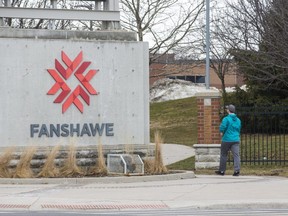It’s too soon to know how the effects of a cap on the number of international students in Canada will affect jobs at Fanshawe College, says the president of a union that represents employees.

It’s too soon to know how the effects of a cap on the number of international students in Canada will affect jobs at Fanshawe College, says the president of a union that represents employees.
Advertisement 2
Article content
“We do have a very high proportion of contract faculty at Fanshawe and their employment is significantly contingent on availability of the work,” said Mark Feltham, Ontario Public Service Employees Union president at Fanshawe College. “We may see less of that work being available.”
Article content
Last month, the federal government announced the number of new visas for international students will be capped at 364,000 this year, almost 200,000 fewer than the 560,000 issued in 2023. Ontario will see its allotment of new visas cut in half.
The caps do not affect existing students.
As well, the province will be required to guarantee housing for incoming international students.
“We have absolutely no information on what cuts (to international study permits) Fanshawe will experience,” Feltham said. “I think it would be unrealistic to expect we would have no cuts, but we don’t know how the province is going to allocate the reduced share of permits that will be available in Ontario.”
Advertisement 3
Article content
Fanshawe College, with campuses in London, Woodstock, St. Thomas, Simcoe and Huron and Bruce counties, has about 40,000 students enrolled in its program, half of whom are international students.
The temporary two-year cap on visas is intended to slow the increase in temporary residents which has put pressure on Canada’s housing supply.
Last month, Fanshawe College’s president called out the federal government for using “a sledgehammer” in response to the increase in international students that has been linked to housing shortages.
“I’m disappointed that the minister chose a sledgehammer instead of a scalpel to deal with the problem of bad actors and housing,” said Peter Devlin, president of the London-based college. “Tools were available, including the allocation of study visas to quality schools like Fanshawe, and having institutions provide a letter of attestation for individual international students.”
Advertisement 4
Article content
Earl Blaney, a registered London immigration consultant, has been critical of some Ontario colleges for taking on more international students than necessary.
“The issue is obviously going to impact jobs,” he said.
As well, the spike in international students has made the housing crisis even more desperate for both the community and students, he said.
“They have a real hard time finding a place or paying exorbitant fees,” Blaney said.
But Feltham said colleges have had to increase their share of international students to stay afloat due to lack of government funding.
“Ontario’s per student funding is 44 per cent of the national average. The (Doug) Ford government cut tuition by 10 per cent and froze it,” he said. “If they are not going to give us grant money and they are going to freeze the tuition at a reduced rate and we’re in a high inflationary environment, they don’t really have a lot of choice.
“I would put this back on the province and say they need to (better) fund postsecondary education.”
Article content